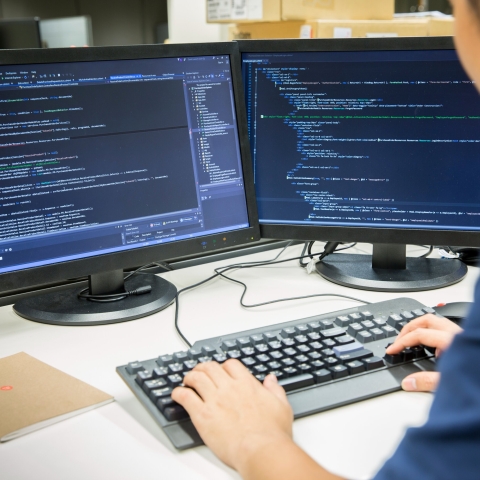
Competition for jobs in Computing and IT is fierce and work experience could be the deciding factor in securing a job within the sector. Not only will you gain an understanding of the type of work undertaken and the various roles, but you will also have the chance to develop a network of contacts for the future.
Types of Opportunities
Below are some examples of the different types of opportunities to gain experience while you study.
Placements will give you a long-term look at an organisation and help you to build contacts and experience. On some degrees, work placements are part of the programme, whilst on others you can choose to complete a placement as one of your modules. Get in touch with the Placements Team in the Careers & Employability Service for more information.
Learn more about taking a placement
You can also choose to take a Self-Employed Placement. This allows you to work for yourself during your placement year and receive support from the University's Student Startup Team. You will have access to funding opportunities, networking events and workshops.
An internship is usually a work experience opportunity that is offered for a fixed period or a limited amount of time. Internships tend to be undertaken by students and graduates who are looking to gain more relevant/industry-specific skills and experience in their particular field.
These opportunities can be paid for a period of between one to four months and typically take place over the summer, with closing dates generally around January to March, but some can be earlier.
Enhance your prospects with hands-on experience through volunteering. Whether you're uncertain about your career path or aiming for professional success, volunteering offers a chance to explore diverse roles.
You can also get involved in relevant university projects through the different groups and societies via the Student Union. This is a good way of demonstrating your motivation and interest in this area of work.
Finding opportunities
The websites below provide further information about placement and internship opportunities across computing and IT:
- MyCareer – the Careers and Employability Service's online jobs board can be used to search for internships, work experience and summer opportunities across sectors and locations.
- HigherIn – offers information on placements, internships, insights and work experience jobs with a range of IT companies in the UK.
- Gradcracker – as the UK’s careers website for Technology students, Gradcracker provides a search function for placements and internships relevant to your degree discipline.
- TARGETjobs – provides a specific section on different career sectors, with the ability to search for placement and internship opportunities in IT and technology.
- Prospects – has its own search tool for work experience opportunities across sectors, including information technology.
- Milkround – provides a search tool for internships and industrial placements across sectors, including IT and related business support roles.

Consider speculative applications
When you approach an employer directly, you send them a speculative application. Speculative applications involve sending a CV and cover letter to an employer to ask if they can offer any work experience, even if the company is not currently advertising placements or internships.
Submitting a speculative application shows your interest in a specific company and your willingness to go above and beyond to develop your skills and understanding of the industry.









